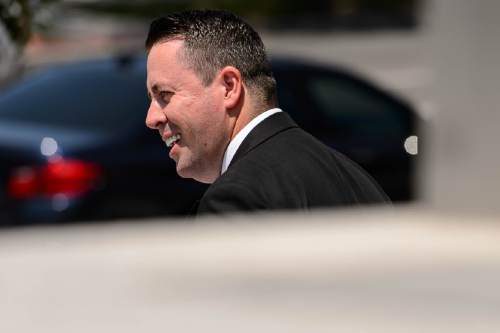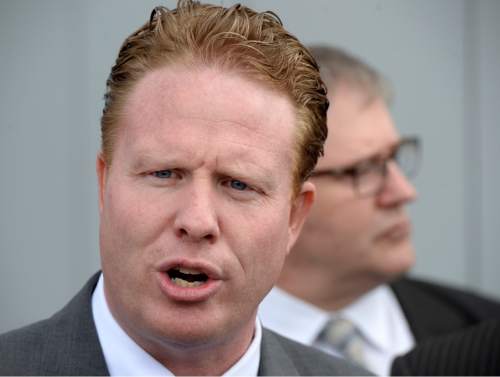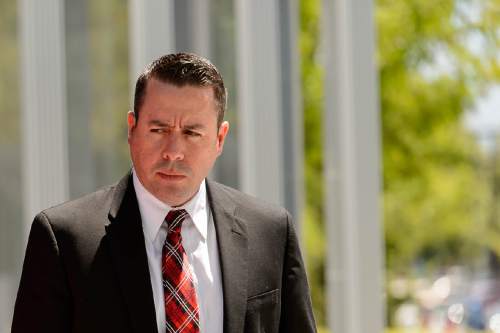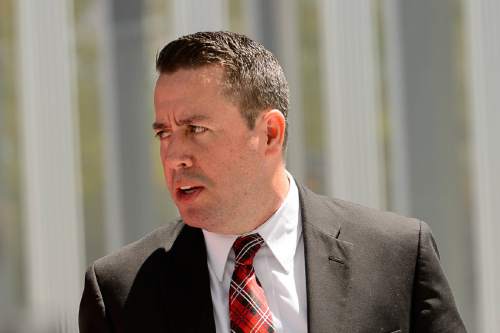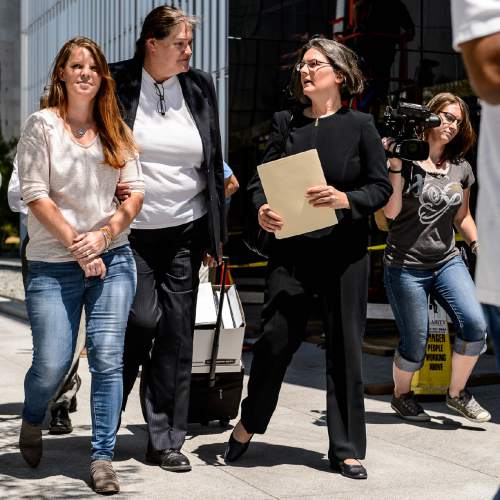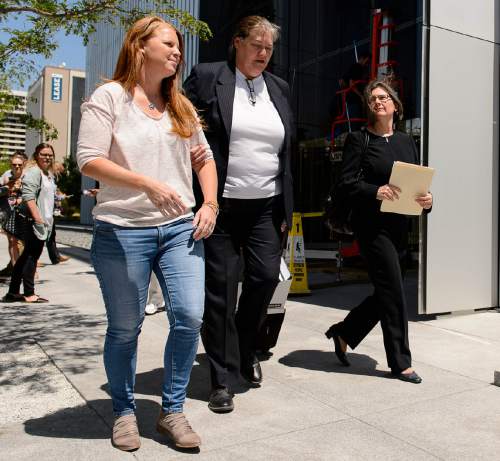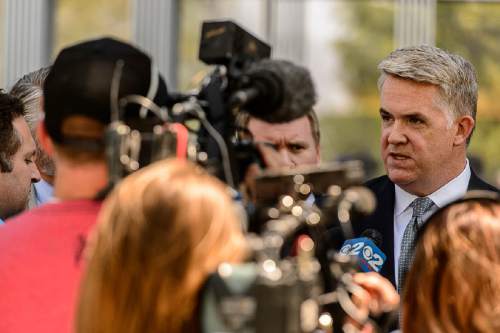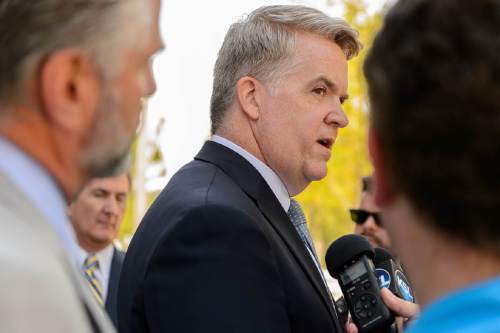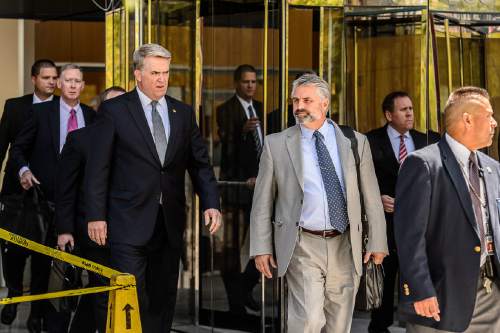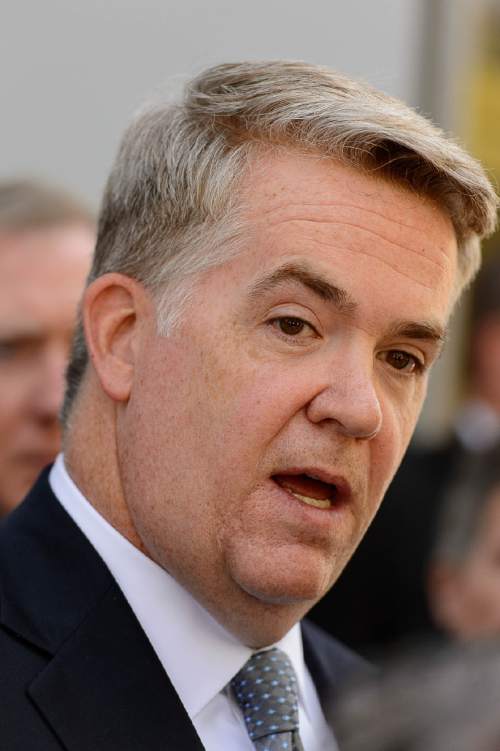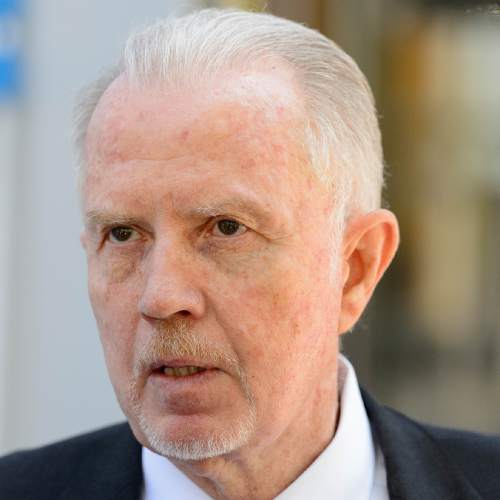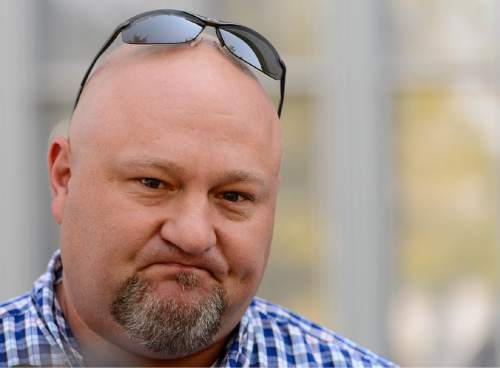This is an archived article that was published on sltrib.com in 2016, and information in the article may be outdated. It is provided only for personal research purposes and may not be reprinted.
A federal judge sentenced St. George businessman Jeremy Johnson to prison Friday with a lecture about morals and comparisons with Vladimir Putin and the contaminating power of sewage.
U.S. District Judge David Nuffer sent Johnson to prison for 11 years and two months on eight charges that a jury found the online entrepreneur guilty of in March. Co-defendant Ryan Riddle, a former manager at Johnson's I Works company, received five years and two months in prison.
Both were convicted on charges of providing false information on applications for bank accounts under the names of straw companies, a process prosecutors say was part of an effort to keep processing consumer credit cards after I Works itself was blacklisted because of a huge number of chargebacks.
The jury found Johnson not guilty of 78 charges related to allegations of bank fraud. Nuffer ruled that Johnson had caused $1.66 million in losses as a result of his actions related to the accounts at Wells Fargo Bank, though the defendants had argued that no entity lost money except I Works.
Prosecutors backed off on their earlier insistence that Johnson caused $23 million in damage, instead signing on to Nuffer's figure of $1.66 million, which still drastically raised the possible sentences.
Nuffer likened Johnson's and Riddle's decisions to open accounts and use false information to the invasion of Ukraine by Russian troops. Putin, the Russian leader, at first said soldiers on leave were acting of their own volition, but later he awarded them medals for their actions, the judge said. Johnson's and Riddle's decisions, Nuffer said, were like putting a small amount of sewage into a barrel of good water, leading to contamination.
"This case is about a personal moral failure on each of your part," Nuffer said, rejecting arguments from defense attorneys for shorter sentences.
Johnson's wife, Sharla Johnson, said after the hearing that she found the "harsh language" in the courtroom discouraging and that the descriptions of her husband were not the person she knows.
"I wish more than anything that they could know truly him outside of this arena," she said. "So many of those things they talk about — I was there and I don't take the same position at all."
A juror in the case, Jason Harper, attended the hearing and afterward called the Johnson sentence "pretty brutal."
Harper said evidence showed banks or their agents, called independent sales organizations, did not lose money in their dealings with I Works and that banks actually were making a "substantial" amount of cash.
Harper said he never expected that Johnson would get more than 11 years in prison because of the jury's verdict, and that the experience left a bad taste in the juror's mouth.
"I never even thought it would even be close to that," he said, adding that he expected the maximum penalty to be "a couple" of years.
Family and friends who had gathered in the courtroom gave the prosecution team a mock applause as they walked out of the courtroom, then they went down backstairs and left the building.
U.S. Attorney for Utah John Huber praised Nuffer's "thoughtful, reasonable" approach to sentencing.
"Today's sentencing represents an important part of our community fighting back against those who trade in their integrity for the name of profit," Huber said outside Salt Lake City's federal courthouse.
Responding to a question, Huber denied politics played a role in Johnson's prosecution, saying the case had nothing to do with the state prosecutions and investigations of former Utah Attorneys General John Swallow and Mark Shurtleff, both Republicans.
It was the second time in the day Shurtleff's name came up. Earlier in court, Assistant U.S. Attorney Jason Burt pointed to how Johnson had received coaching from Shurtleff on how to "undermine the process" at a January 2013 hearing over a plea deal that Johnson had reached with prosecutors, but over which no final agreement was reached.
Burt referred to a meeting between Shurtleff and Johnson in which the businessman sought advice from the then-attorney general about the plea deal. Johnson recorded the meeting.
A judge this week granted a motion from the prosecution to dismiss all charges against Shurtleff that had resulted from investigations begun after Johnson said Swallow had helped arrange a meeting between Johnson and a payday-loan entrepreneur, during which they allegedly hatched a plan to enlist Senate Majority Leader Harry Reid, D-Nev., to stall a federal regulatory investigation into I Works.
Johnson had been named as a witness in the prosecutions of Shurtleff and Swallow, separate cases from which the U.S. attorney's office recused itself. The Federal Trade Commission sued I Works in 2010; that case is pending in a Nevada federal court.
Johnson first faced a single charge of mail fraud in June 2011, but when the plea deal blew up in 2013, prosecutors obtained a new grand-jury indictment that swelled the number of charges to 86 and added four former I Works managers as defendants.
The jury, in a seven-week trial, acquitted Johnson, who acted as his own lawyer, on 78 other fraud-related charges and found Riddle, who also represented himself, not guilty on a host of charges he also faced. Defendant Scott Leavitt was found not guilty on all charges. One other defendant had charges dismissed when he said an immunity agreement was breached and another defendant reached a plea agreement.
Since the end of the trial, several jurors have said publicly that they believed Nuffer was biased against the defense.
Jurors also said that the only false information they found in applications for the accounts was the number of employees each of the straw companies was supposed to have.
On Friday, one of Johnson's attorneys, Mary Corporon, who came aboard after the verdict, urged Nuffer to look at Johnson's good works, including his efforts to help the people of Haiti after it was devastated by a huge earthquake.
"There are many people who adore this man and who are thankful for his efforts," she said.
Another Johnson attorney, Karra Porter, said there will be an appeal to the 10th Circuit Court of Appeals in Denver; she also said there were possible constitutional issues to take to the U.S. Supreme Court.
Porter already had asked Nuffer to grant a new trial, saying the judge had made remarks that could lead the jury to believe he thought the defendants were guilty. Nuffer also improperly excluded evidence from the defense that would have shown that the number of employees on the account applications was not relevant to the decisions on whether to approve them, Porter said in a motion that the judge rejected this week.
"Jeremy was sentenced, in part, based on conduct for which he was acquitted by the jury," Porter said Friday. "Many federal judges have criticized the practice of considering acquitted conduct in sentencing."
Johnson chose not to address the judge during the hearing. Riddle offered a long explanation of the history of how I Works tried to deal with the problem of excessive chargebacks. Riddle said he disagreed with the plan to manage the problem by setting up shell companies in order to continue processing while trying to weed out the problems causing chargebacks, and that he left the company because of that.
"I found myself defending myself in court [over the business plan] that I despised seven or eight years ago," he said.
Riddle's attorney, Steven Killpack, said there also would be an appeal of Riddle's sentence and the jury trial.


